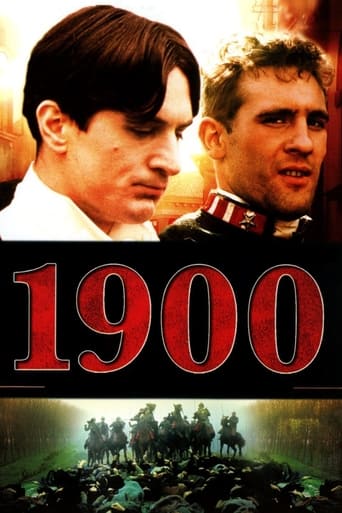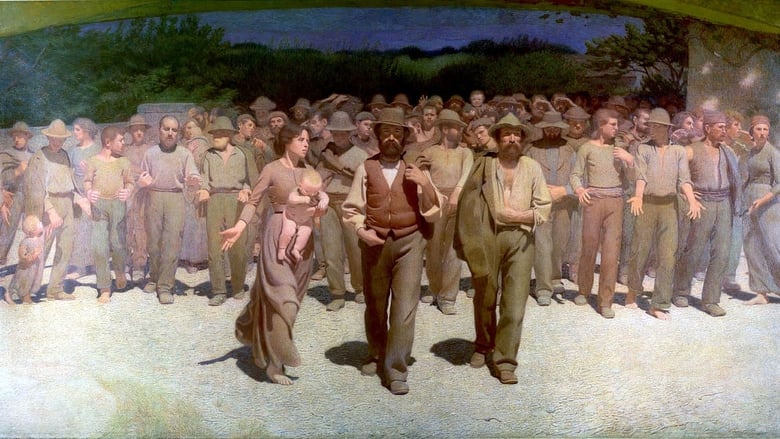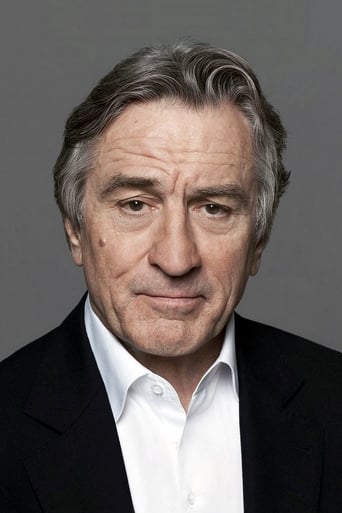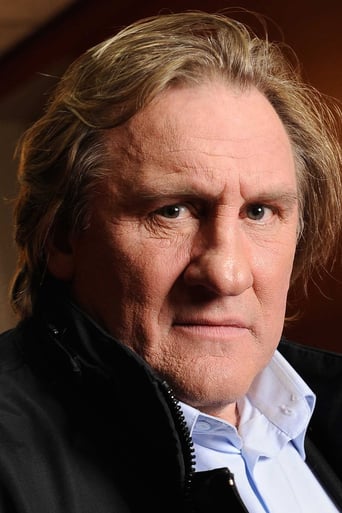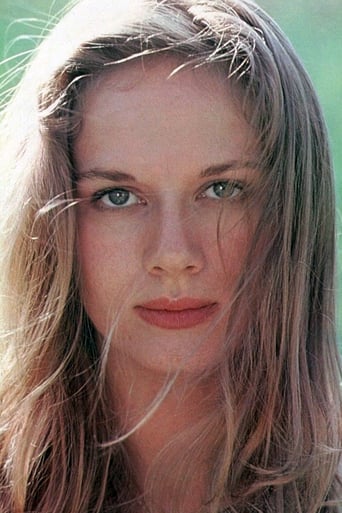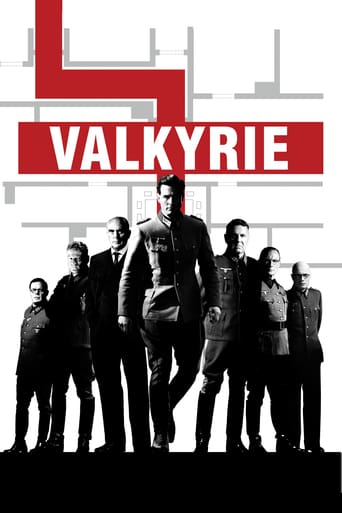1900 (1991)
The epic tale of a class struggle in twentieth century Italy, as seen through the eyes of two childhood friends on opposing sides.
Watch Trailer
Cast


Similar titles
Reviews
What a shame; I had such high hopes for this film. With a cast and budget of fantastic proportions it seems the director was overwhelmed. I love epic tales of conflict and victory that I can lose myself in and become part of the story. Unfortunately this movie never develops any character to care about, there is a confusing collage of scenes some of which are breathtakingly beautiful, just no cohesion. There have been films that I didn't want to end The Godfather, The Deer Hunter, Band of Brothers. This became a bloated rambling mess that I struggled to finish. It seemed the director struggled as well never developing a storyline that could engage me and ending without ever making a statement. What a shame
Two friends – Alfredo Berlinghieri (Robert De Niro) and Olmo Dalcò (Gérard Depardieu) – come from two different social classes. The former is an aristocrat who is relatively good to his subordinates, while the latter is a bastard peasant's son believing in communism. Their social stances entail clashes between them in the first half of the 20th century during which numerous disturbances occur This glossy, contentious epic directed by Bernardo Bertolucci and stunningly shot by the great Vittorio Storaro is occasionally enchanting, unremittingly ambitious, frequently perplexing as well as overflowed with concepts and self-indulgent monologues. Viewing this imposing film is like peering at a dilapidated ancient temple – the further a visitor steps in, the more constructional damages he beholds. As usual in case of Bertolucci's efforts, the ensemble is displayed in a non-linear manner, beginning on the day of the liberation of Italy in 1945 and successively recurring to the moment of two protagonists' birth – they are born on the same day. This time the composition is not to blame forasmuch the entire action unfolds in a relatively straight-forward way, evading any unnecessary intervals and being one huge flashback itself. Upon being regaled with an enviable artistic freedom, Mr Bertolucci executes his tale about political maelstrom in fascist Italy with indubitable meticulousness and surgical precision. The first act is particularly ravishing and owing to the length of the movie, Bertolucci is able to render characters sufficiently profound and their intentions and needs plausible. There is a fine role of Alfredo Berlinghieri the Elder (an uncle of the protagonist played by De Niro) acted by Burt Lancaster which conveys psychological depth to the motion picture and resembles Prince Don Fabrizio Salina from Il Gattopardo (1963) by Luchino Visconti, likewise performed by Lancaster. Alfredo Berlinghieri The Elder cannot disclose any consolation in his old age and feels desolated by his family which is generally preoccupied with their inheritance. But for this poignant character, it would have appeared a mere communist propaganda. In the second half, the realistic tone is upended by a virtually caricatural couple of fascists played by Donald Sutherland and Laura Betti. Their relationship which is prefaced by an excessively pompous monologue proclaimed by Sutherland seems unrealistic and the nature of their first sexual experience involves a young boy who supposedly is raped by them (nothing is exposed explicitly). The entire sequence transpires in one of the rooms of the Berlinghieri's mansion as though it was a perfect place to perform forbidden acts such as paedophilia. It's likewise far-fetched that the publicly-recognised fascist dares to debauch a small boy as if he wasn't apprehensive of possible consequences. The entire event which is supposed to be disturbing is very contrived, forced and improbable – the entire situation's purpose is concealed by a backdrop of incomprehensibility. Possibly it is intended to be a reference to Salò (1975) by Bertolucci's mentor – Pier Paolo Pasolini. If it is so then this is an extremely awkward connection.Still, insipid instants are few and far between, despite being rather leisurely paced. Mise en scène is quite strong, despite some foibles regarding flick's climax. The auxiliary cinematography by Vittorio Storaro is delightfully flamboyant as well as one of the biggest advantages of Novecento, even though it is not one of Storaro's finest efforts. Storaro succeeds in dousing every scene in an adequate portion and colour of the lighting, imbuing the celluloid with disparate hues, ranging from cold (grey and blue) to warm ones (yellow and red) to the extension that at one point, flowing water in a river reminiscent of orange juice. The cast is simply remarkable and Mr Bertolucci must have been ecstatic about possessing such actors as Burt Lancaster, Robert De Niro, Gérard Depardieu, Dominique Sanda, Romolo Valli, Donald Sutherland, Stefania Sandrelli and Laura Betti at his disposal.Novecento undoubtedly implicates a marvellous appearance and impressive décor, nevertheless in the middle, it embarks on being at a loss for a specific direction and Mr Bertolucci ultimately steers the material onto cinematic shallows. The main topic of mutual relationship between Alfredo and Olmo nearly becomes a background to the events occurring on the screen and after some time, one is likely to forget what it was all about. Mr Bertolucci unabashedly relishes with film's grandiloquence and themes, not making allowances for the possibility that it is all too greasy and there is too much of this opulence and monumentality. Personally, I think it was occasionally engaging, even delightful, but towards the denouement it gets too pulpy, too obviously communistic as well as virtually devoid of main heroes. It almost feels as if one was teleported to a gathering of left-wing revolutionaries wielding Kalashnikovs and willing to assassinate you in any minute inasmuch you are not holding a red flag, not to mention the confounded resolution which leaves its viewer confused.
I watched this film years ago, as I wondered into the cinema, excited by seeing the name of Bernando Bertolucci. And I still suffer from memories. There are a few films out there, that have had such an impact on me. It scarred me for life. Seriously. The visions of pigs slaughter, child rape, one of the most brutal murder scenes a human mind can ever imagine and the creepiest smile of Donald Sutherland still haunt me. Besides the very disturbing scenes, the film is absolutely marvellous, depicting emergence and spreading of fascism in Italy. It is a masterpiece indeed, but scary, scary masterpiece. Definitely not suitable for children under 18. I learned the hard way.
Bernardo Bertolucci's Novecento has five hours and fifteen minutes and before we know it this historical epic ends and we're left craving for more. That's the ultimate grace of Bertolucci's masterpiece: one never feels the movie's length; it flows and involves us so hypnotically in its story that we lose sense of time. The story is so finely constructed, the actors so good, the cinematography so breath-taking, the music so exciting, that one curses the unavoidable moment when the credits roll down the screen.Released in 1976, Novecento is, as the title says it, a story of Italy in the 20th century, from its beginning to the year of its release. Known in the USA as 1900, I chose the Italian title because this one misleading. The action starts the year Italian composer Verdi dies, so it's actually 1901 (Bertolucci knows the Gregorian calendar unlike the majority who believe in pop culture). Two children are born, Alfredo and Olmo, the first the heir of the Berlinghieri estate and fortune, the second the bastard offspring of Alfredo's father and a peasant woman from the Dalco clan. They grow together and their lives, although going in different ways many times, continue to intertwine throughout the decades, from the aftermath of WWI to the rise of Fascism in Italy, to the liberation of Italy in 1945; they're always together until their old age.Novecento is effectively about the organisation of the labour rights movement in Italy and its clashes with Fascism. Olmo (Gérard Depardieu), returned from the WWI, sees communism as a way of uniting the peasants in the struggle for better wages and more rights and end the hunger and humiliations perpetuated by the padrones, the bosses.Parallel to the labour rights movement's organisation is the rise of fascism, embodied by Attila Mellanchini (Donald Sutherland), the Berlinghieri forearm who organizes the local Black Shirts. In the middle of this struggle is Alfredo (Robert DeNiro), a bon vivant who only seeks pleasure and finds love in Ada (Dominique Sanda), an avant-garde woman who fascinates him with her sense of modernity. Unwilling kept away from the war thanks to his father's money, Alfredo sees Olmo's return as good news until politics and his inevitable fate of becoming the new padrone get in the way, not to mention his inability to stand up to Attila.The film is shot in four sections, each one employing a different color palette, to represent each station of the year. So the first part, Olmo and Alfredo's birth and childhood, is bathed in bright summer colors; the WWI's aftermath is filmed with autumnal browns. The Fascist reign is grey and drenched in winter rains, and only Italy's liberation gives the movie its bright early colors with the coming of springtime. This is one of the greatest achievements of Vittorio Storaro, a director of cinematography who never ceases to amaze me. He's lent his talent to many good movies over his legendary career (Apocalypse Now, The Conformist, The Bird with the Crystal Plumage, Reds), but I've never loved the look of one of his movies so much except perhaps in an earlier, much neglected Bertolucci movie called The Spider's Stratagem. Each shot could be a painting.The actors are also excellent here, especially the veterans Burt Lancaster (who plays Alfredo's grandfather, also named Alfredo) and Sterling Hayden, who plays Leo, the patriarch of the Dalco family. They're in the movie for about an hour, but their performances are amazing enough to leave an impression, especially Hayden's.As much as this movie is about fascism and communism, it's also about class differences and class clashes, and this is shown in the three Berlinghieri generations. Grandfather Alfredo and Leo have a relationship based on respect and co-dependence. His son Giovanni brings technology and consequently unemployment to his lands as well as the violent Attila to keep the workers in order, and also ends many of the ancestral rights the workers had. His despotic rule marks the beginning of the peasants' consciousness that change is necessary. Giovanni's brother, Ottavio, is his opposite, preferring to travel and enjoy life, much like his nephew. Finally Alfredo simply doesn't care, pursuing self-gratification and allowing Attila to gain power and impose a reign of terror in his lands, with the help of Alfredo's cousin, Regina (Laura Betti).Donald Sutherland has always had a gift for playing villains but he set a bar too high even for himself to surpass when he played Attila, the sadistic Black Shirt who crushes kittens to make philosophical points about communism, molests children and kills helpless old people. Fans of Sutherland who wish to see him at his darkest and most intimidating mustn't miss this film.DeNiro, Sanda, Betti and Depardieu are also very good, with Depardieu outshining DeNiro only because he has a more demanding and visible role. Sanda is also good, even if her role is to be basically annoying most of the time. Betti makes a great demonic pair with Sutherland. DeNiro, today the most famous of the actors who worked in this film, delivers one of his typically good performances, but he doesn't reinvent himself like in Taxi Driver or Raging Bull. This is Depardieu's film.Also worthy of note is Ennio Morricone's score, containing many of his most uplifting compositions. Bertolucci made this film to inflame hearts and rouse consciousnesses, to make viewers leave the cinemas anxious to change society and make the world a better, fairer place, so Morricone's music works perfectly with the images. And even if Bertolucci's goal ultimately failed, the movie is so well crafted its grandiose finale should leave viewers pretty upbeat and hopeful.No review of Novecento can do the movie justice. It's a work of art, it must be watched.

